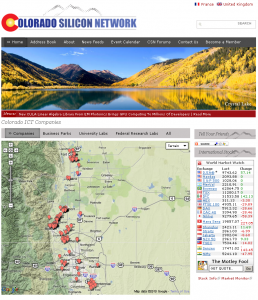People who have read this site before are sure to have seen some of the witty comments from our friend Fluxor, who writes on his site, Flying Flux. What you may not have taken the time to find out is that Fluxor is a successful analog chip designer and has worked on myriad designs throughout his career. In my continuing quest to learn more about analog electronics, and specifically the difference between an analog system designer and an analog chip designer, I asked Fluxor if he’d answer a few of my questions. He was very gracious with his time and gave great insight into the world of analog chip design.
CG: Could you explain your background? What kind of schooling did you get and what subjects did you focus on?
Fluxor: I studied Electrical Engineering at the University of Waterloo (largest engineering school in Canada) where there’s a mandatory co-op program which allowed me to get a peek inside industry during my undergrad years. I worked for a laser company (now defunct), a telecommunication giant (now defunct), an aviation equipment company (now defunct), and my own company that I started with classmates (now defunct). I was especially interested in analog circuits (see It’s a Digital World…) and pursued that interest in the form of a Master’s degree at the University of Toronto (largest EE grad school in Canada).
CG: What kind of demand was there for engineers with your skill set when entering the job market? Do you think those same demands exist today and into the future?
Fluxor: When I finished my Master’s, it was the golden age of hi-tech, a few years before the dot-com bubble burst. Within 2 weeks of starting my job search, I had four job offers in my hands. Today, new grads have a really hard time finding jobs and the future job growth in hi-tech is no doubt in China and India. My company’s CEO, who I like to call the Big Flux, recently said explicitly that the company intends to hire mostly in these two countries with only very targeted hiring within North America.
CG: What kind of (technical) software do you use on a daily basis? How much time in a day is spent with that software?
Fluxor: I used to use Cadence software on a daily basis until I moved into a team lead position. Nowadays, I mostly use Microsoft products in my role as a “PowerPoint Engineer“.
CG: You work with leading edge technologies. How do you begin to rectify the theoretical knowledge with the on-chip realities? Does simulation take care of most problems or is some kind of other prototyping possible?
Fluxor: Simulation accuracy depends on model accuracy. Model accuracy depends on a stable manufacturing process. Leading edge, by definition, means that the manufacturing process has yet to become stable. Designing with ambiguity is part of the job, but the situation is getting worse as technology advances and transistors move ever so much more into the nano-world.
Theoretical knowledge provide you with a starting point in design and is great for understanding first order or perhaps even second order effects. Beyond that, simulations are necessary. But because the models may be unreliable, engineers must either over-design or ensure designs are inherently insensitive to manufacturing variations.
Prototyping is possible — that’s called taping out a test chip. You don’t get too many testchips as they are very expensive (millions of dollars for each iteration). Most of our designs have one testchip. The next one is supposed to be the real product, although with design bugs, multiple iterations (or sub-iterations, such as metal changes) are not uncommon.
With chip design, you not only have to make the chip work, you have to make sure that out of the millions of chips that are produced (one product that I worked on is now in production — 1 million parts per week), almost every single one of them will work across varying supply voltage levels and temperatures. That’s called designing for manufacturability or designing for yield.
CG: What is the granularity of the pieces of the design you work on? Are you creating entirely new transistors or piecing them together into larger structures? Who does the architecture for the entire chip? How do you interact with people that create other components in that architecture?
Fluxor: I rarely do circuit design nowadays, but not too long ago, when I designed a PLL, I had to design at the transistor level for almost every single sub-block of the PLL. This means VCOs, charge pumps, loop filters, dividers, etc. That means deciding how large of a transistor you’d need and then stitching them all together to make, for example, a charge pump. Then at a higher level, stitching together the charge pump with the loop filter with the VCO, etc. to make a PLL. At the PLL level, system level simulations can be done with Matlab or other high level simulators, like Cadence’s AMS (analog mixed-signal).
Architectural work can be done at the block level, sub-system level, system level, chip level, board level, etc. How many levels you have in the chip depends on its complexity. There’s a good amount of architectural work that’s required at each level of design. Some are done by circuit designers, some are done by “architects” that do mostly Matlab simulations, and some are done by digital folks who are responsible for stitching each component of the chip together.
As for interactions with other groups — meetings, meetings, and more meetings.
CG: How much interaction do you have with the process people in the fab? Do you have any design decisions on low level characteristics (doping, etc) or is that preset as building blocks you are allowed to work with? Do you spend any time in the fab?
Fluxor: None, no, and no. Our company does have a group that deal directly with the fab. They have more say in how things are done.
CG: Once you receive first silicon how much time do you spend on the bench verifying the design? Do you take care of that yourself or is it left to test engineering?
Fluxor: Testing can go on for a year or two. Some of it is done locally in our new expensive lab, but most of it is left to test engineering with guidance from the circuit designers.
CG: How much do you hear back from end users on the implementation of your device? How does this feedback affect your future design decisions? Are you told to design to a certain specification or is it more of “As good as possible” for all characteristics?
Fluxor: Our customers are not end users. They take our chips and put them into a larger product that then gets sold to end users. We only hear back from our customers and their feedback can very well impact future design decisions. Our specs are a combination of hard specs (non-negotiable) and soft specs (I’ll do my best to meet them). Mostly, they’re hard specs.
CG: What, if anything, do you wish was different in your specific job? Do you wish you did anything differently in your career?
Fluxor: For me personally, I wish I didn’t have to work with the Psycho Colleague. But overall, this is the best company I’ve ever worked for. For one thing, it’s not defunct…yet; for another, I get free food! It’s also best job I’ve ever had and I feel awfully blessed to be in such a position; my last job was the absolutely worst job I’ve ever had (yes, even when compared against my high school job as a french fry maker).
If I had to do it all over again, I would have tried to work for Goldman Sachs. One year’s worth of bonuses is enough to retire on. I can then take that money and do all the cool and wacky engineering that I’d really like without worrying about money.
It was really great of Fluxor to take the time to explain the kinds of experiences he has had in the industry. In my own position I have realized that there are lots of different roles throughout the “electronics food chain”, from the chemical suppliers to a fab, to a test engineer in a packaging factory in China, to a board level designer such as myself, all the way to the sales people that hand you the cell phone you just purchased. I hope to find and talk to more people throughout the industry and get their perspective on how they view their positions and how they fit into the larger electronics scene. If readers know anyone, I would welcome suggestions. And of course I would try to focus on how the jobs of those I talk to specifically relates to analog electronics.
If you have any questions, please leave them in the comments and be sure to click through some of the links above and read Fluxor’s daily experiences!



